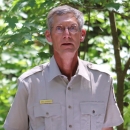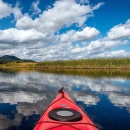Hello neighbor,
I am reaching out to in an effort to connect with private landowners around the Rachel Carson National Wildlife Refuge (refuge). As you may know, the refuge encompasses 5,690 acres across eleven municipalities from Kittery to Cape Elizabeth in York and Cumberland counties. This beautiful area of southern coastal Maine consists of small but steadily growing communities interwoven within an abundant network of forests, grasslands, waterways and salt marshes. The natural habitat here is critically important for a diversity of wildlife. Many of our fellow Mainers and visitors enjoy recreating in the protected natural areas that can be found just a short distance from our homes and workplaces. Our home communities and these natural areas together define our local culture and provide for our unique quality of life, something many of us wish to preserve for ours and future generations to enjoy.
Across the country, the U.S. Fish and Wildlife Service is interested in continuing the work of protecting natural and working lands, restoring habitat on open land and salt marshes and acquiring properties from willing sellers that lie in close proximity to existing refuge lands. Here in southern Maine, the refuge is currently purchasing lands and conservation easements from willing sellers. A conservation easement conservation easement
A conservation easement is a voluntary legal agreement between a landowner and a government agency or qualified conservation organization that restricts the type and amount of development that may take place on a property in the future. Conservation easements aim to protect habitat for birds, fish and other wildlife by limiting residential, industrial or commercial development. Contracts may prohibit alteration of the natural topography, conversion of native grassland to cropland, drainage of wetland and establishment of game farms. Easement land remains in private ownership.
Learn more about conservation easement is a transaction where the owner retains the land as their private property but conveys certain rights that protect the property’s wildlife habitat in perpetuity. We also gratefully accept land donations when they contribute to refuge purposes.
If you would like to talk about the benefits of protecting your land and integrating it into the National Wildlife Refuge System, please reach out to me by phone or e-mail using my contact information below. I have attached links describing the work of the Rachel Carson NWR and our Realty Division for your review on the second page of this letter. I hope to hear from you soon!
Publication date
Type of document
Education
Facility
Program
Species
FWS Focus
FWS Focus
FWS and DOI Region(s)




